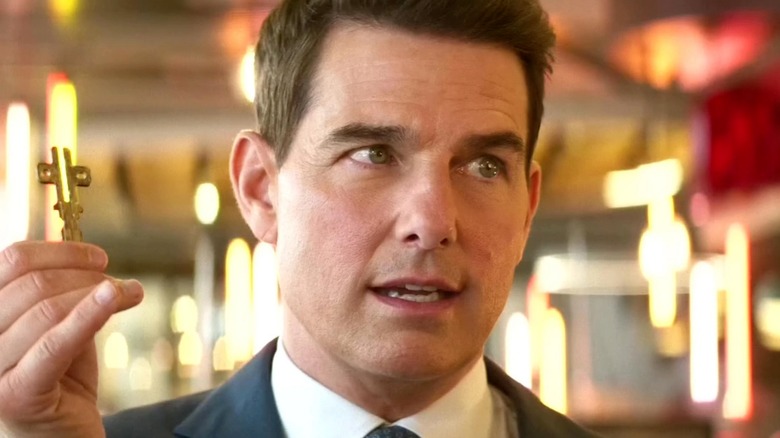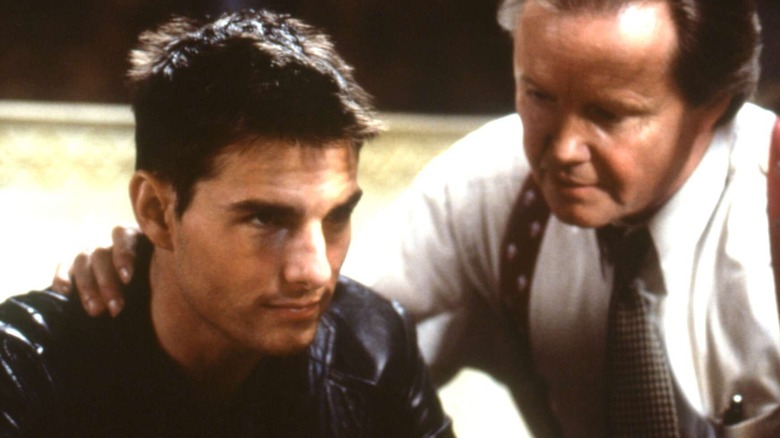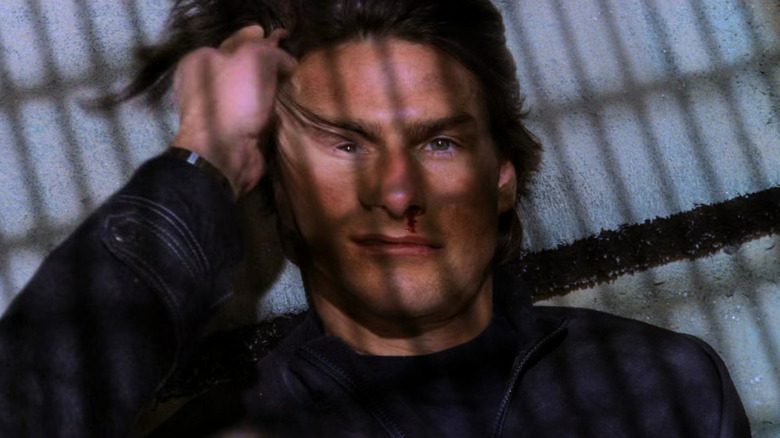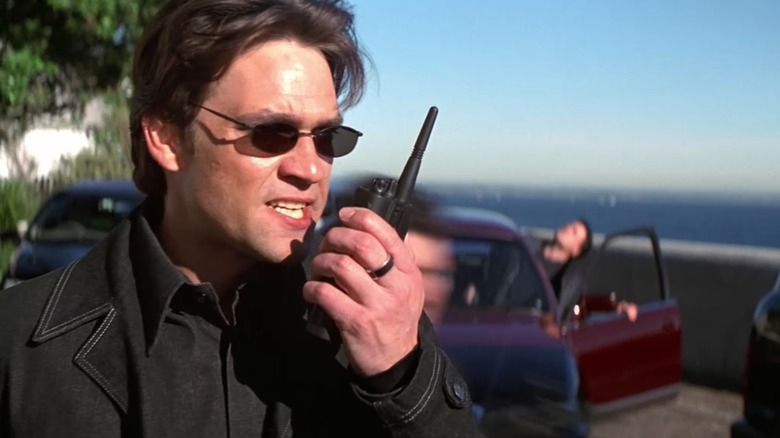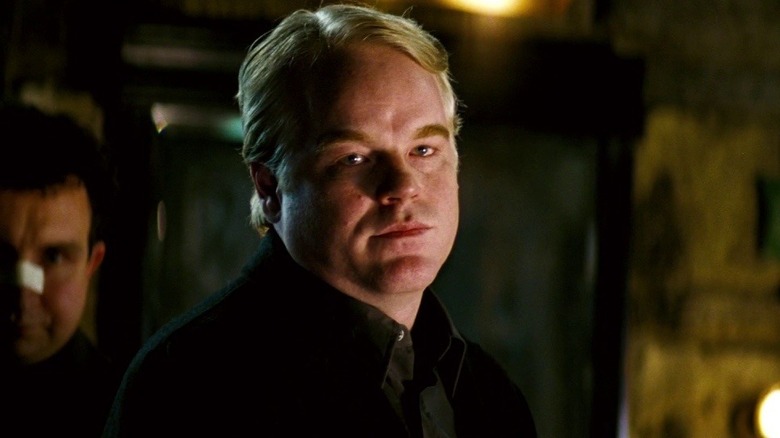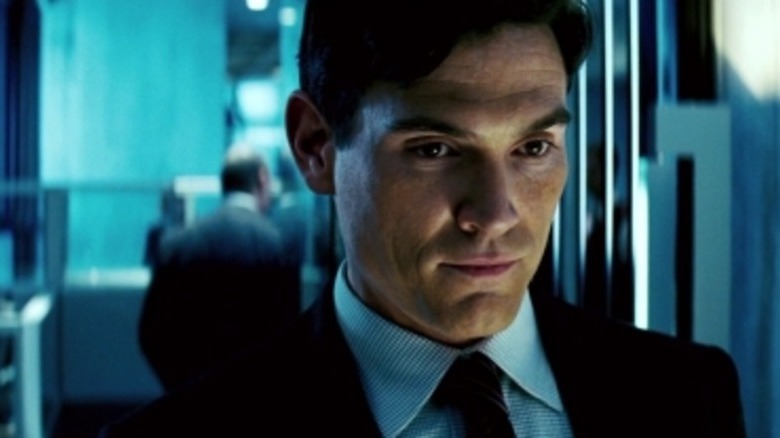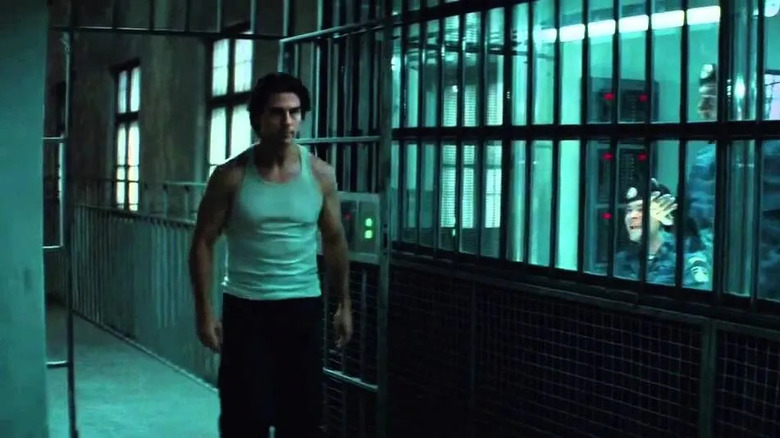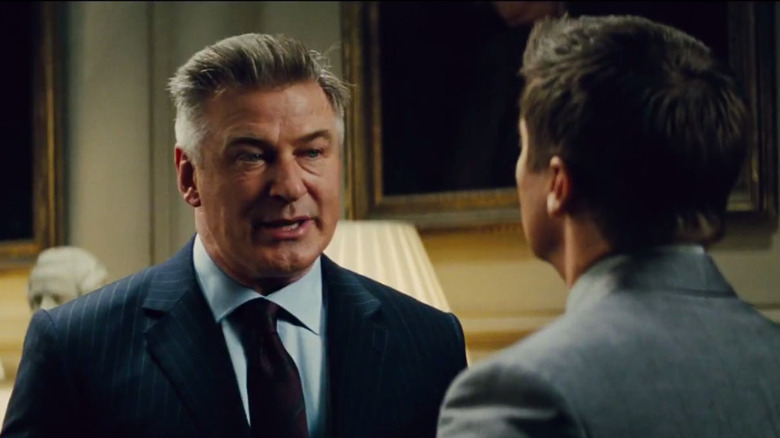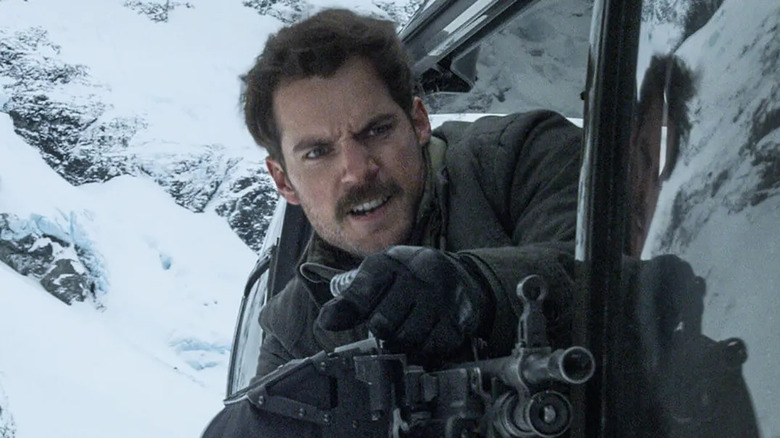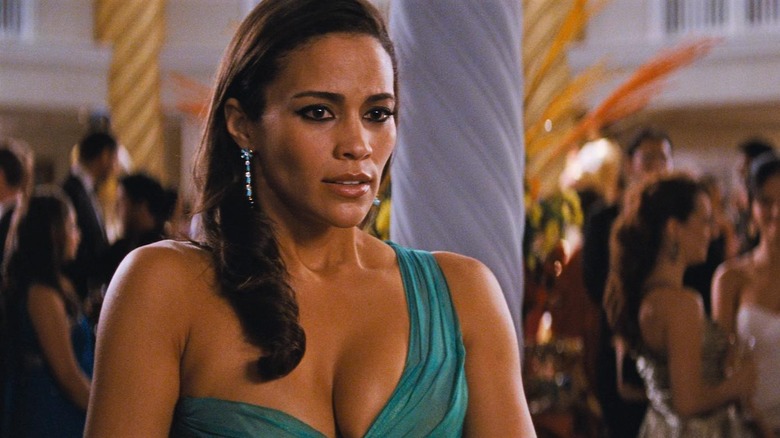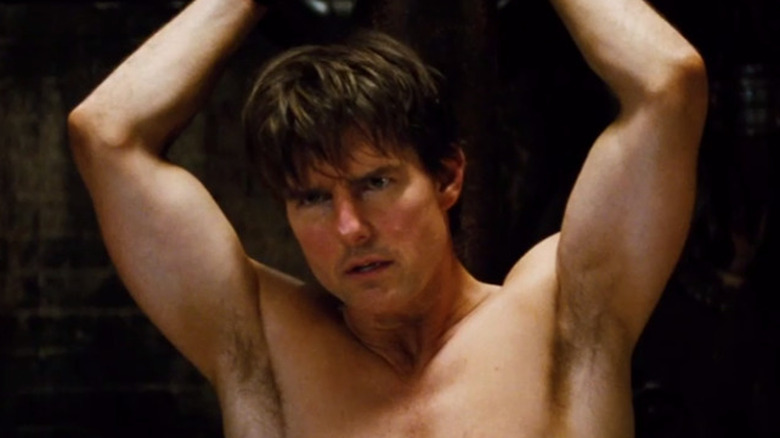The Mission: Impossible Franchise's Most Confusing Moments Explained
Ever since 1996, movie audiences have been thrilled by the "Mission: Impossible" film series, delivering high-octane action with some of the biggest and best stunts in Hollywood. Across the movies, Tom Cruise stars as Ethan Hunt, a veteran operative for the Impossible Missions Force (IMF) who takes on missions around the world in defense of the free world. With the series' penchant for complete subterfuge, shadowy betrayals, and clandestine conspiracies, the proceedings within each movie can occasionally become a bit confusing as the plot keeps viewers guessing as to who they can trust.
We're going to take a closer look at the most confusing moments throughout the "Mission: Impossible" movies, with explanations about what exactly is occurring in each respective film and details that aren't necessarily provided up-front. Ethan and his circle of intelligence agency experts may be grasping at straws in the dark, but this guide to the bigger "Mission: Impossible" story will light the way for you.
How exactly did Phelps betray the IMF?
One of the characters from the classic "Mission: Impossible" television series to appear in the original 1996 film is Jim Phelps (Jon Voight). While the TV show had portrayed Jim as the veteran field leader of the IMF, with unwavering loyalty, the movie's big twist positions the character as a murderous traitor. In contrast to the subsequent, more high-octane sequels in the franchise, the first "Mission: Impossible" movie is a much more cerebral affair, making the circumstances behind Jim's betrayal more convoluted.
On a seemingly routine mission in Prague, Jim and his team are seemingly systematically killed by unseen forces, leaving Ethan and Jim's wife Claire (Emmanuelle Beart) as the only apparent survivors. Ethan learns that a mole on the team was working for a notorious arms dealer named Max (Vanessa Redgrave) for a list of undercover CIA operatives, with the mole eventually revealed to be both Jim and Claire. To make matters more confusing, the list Jim supplies Max with is a fake, prompting Ethan to steal the actual list from CIA headquarters in Langley to draw Jim out of hiding. This complicated plot has Ethan temporarily ally himself with Claire, Max, and Jim's associate Franz Krieger (Jean Reno) before Ethan betrays the traitors, killing them and having Max arrested. With alliances this mercurial and duplicitous, it may be hard for the audience to keep track of all the twists and turns.
How did Ethan switch places with Hugh Stamp?
The most recurring trick in the IMF team's playbook is its cutting edge technology that can flawlessly recreate a target's face as a life-like mask, complete with a voice box to reproduce the individual's voice. These masks become a major fixture in "Mission: Impossible 2," with Ethan and the rogue IMF agent Sean Ambrose (Dougray Scott) each using them to deceive each other's associates. However, creating these masks is a painstaking process, raising the question of how Ethan was able to create a mask of Ambrose's main associate Hugh Stamp (Richard Roxburgh) with such short notice.
After infiltrating Ambrose's lair, Ethan fights Hugh alone in a quick scuffle, resulting in Hugh evidently bringing a captive Ethan to Ambrose to execute personally. As Ambrose realizes he accidentally murdered his best friend, Ethan escapes with cure to the Chimera Virus held by the terrorists, having used masks of himself and Hugh to fool Ambrose. Given the size of the mask-making printer and the amount of time involved, this suggests Ethan would have had to infiltrate Ambrose's compound with masks of himself and Hugh already made and in tow for the deception. The IMF has always been an organization priding itself in meticulous planning, but Ethan takes it to the next level with this master strategy.
What is Ambrose's grand plan?
Ambrose's plan itself is one of the more convoluted antagonistic schemes in the film series to date, with his plans for the Chimera Virus and its cure more complicated than necessary. Ambrose goes rogue in order to steal the only known cure for the virus, hiding out with a private army of terrorists in Australia. However, instead of planning to hold the world hostage in exchange for the cure or unleash the virus for chaos' sake, Ambrose is driven by a burning desire for stock options.
After stealing the last sample of the genetically engineered Chimera Virus, Ambrose plans to use it to leverage himself as the majority shareholder of the pharmaceutical company responsible for the cure. Once news of the virus becomes public and world governments begin purchasing mass quantities of the cure, Ambrose anticipates becoming rich beyond anyone's wildest dreams. This begs the question of how Ambrose plans to keep his role orchestrating this scheme a secret, especially with the IMF already aware of his activities. A simple ransom plot may have been the easier route for Ambrose to go, though likely with far less hyper-stylized action set pieces to make it interesting.
How did Davian learn Ethan's background?
The primary antagonist of "Mission: Impossible III" is Owen Davian (Philip Seymour Hoffman), an arms dealer linked to a deadly bioweapon nicknamed the "Rabbit's Foot" located in Shanghai. The fight against Davian becomes personal when he murders Ethan's protégé Lindsey Farris (Keri Russell) after she is caught spying on him, with Ethan violently interrogating Davian upon capturing him. Ethan's longtime teammate and friend Luther Stickell (Ving Rhames) is able to talk Ethan down but not before mentioning Ethan's first name, which Davian manages to overhear.
Based on hearing Ethan's first name and seeing his face, Davian is able to take revenge on him after he escapes by tracking down and kidnapping his fiancée Julia Meade (Michelle Monaghan). For Davian to be able to accomplish this with so little information to work with is impressive, even for someone as well-connected as the evil arms dealer. However, like many films in the series, the IMF has a traitor in its midst, likely providing Davian the information he needs to strike at Ethan's personal life. Ethan had temporarily left the IMF behind in a bid to settle down but, with a threat like Davian, the veteran covert operative learned that his family and home would forever be vulnerable to his enemies.
Why did Musgrave betray the IMF?
By "Mission: Impossible III," it begins to feel like every film in the series has Ethan contend with a traitor and, in the 2006 film, it's IMF Assistant Director John Musgrave (Billy Crudup) who betrays the team. Though Musgrave helps Ethan escape from IMF custody, it's all part of an elaborate ruse to allow Ethan to obtain the Rabbit's Foot, with Musgrave and Davian secretly working together to use the bioweapon for themselves. Musgrave's rationale for going through such extreme lengths to get the Rabbit's Foot is one of the more bewildering elements of "Mission: Impossible III," coming off as a betrayal largely for shock value.
After revealing himself to Ethan as a traitor in league with Davian, Musgrave explains that he plans to relinquish the Rabbit's Foot to a terrorist organization in the Middle East. Having created a false flag operation, the American military would have a fabricated justification to maintain a prominent presence in the region for the foreseeable future. With Musgrave aware of the Rabbit's Foot's existence all along, in addition to its secret location in Shanghai, it's a wonder why he sent Ethan after Davian rather than send them to China on false pretenses. This backwards thinking, including getting Ethan out of retirement, ultimately proves to be Musgrave's undoing when Julia kills him after he reveals his true colors.
Why is Ethan in a Russian prison in Ghost Protocol?
"Mission: Impossible – Ghost Protocol" begins with Ethan locked away in a Russian maximum security prison for an indeterminate amount of time before he is freed by the IMF. Over the course of the film, it's revealed that Ethan was imprisoned for murdering a group of Serbian terrorists who were apparently responsible for murdering his wife, Julia. New teammate William Brandt (Jeremy Renner) blames himself throughout "Ghost Protocol" for the tragic series of events, as he was assigned to personally ensure Ethan and Julia's safety.
This all proves to be another grand deception, with Julia faking her death and taking on a new identity while Ethan's incarceration was part of a plan to reach an imprisoned informant named Bogdan (Miraj Grbic). It's unclear if Ethan actually murdered a group of Serbian terrorists to maintain his cover and facilitate his arrest and conviction. In a bittersweet (if slightly reckless) move, Ethan reunites with Julia from afar in the final scene of "Ghost Protocol," with the two exchanging a meaningful glance before parting ways again. "Mission: Impossible III" had given Ethan his potential happy ending and exit from the IMF, but "Ghost Protocol" brings him right back into action, even if the methodology is a bit murky.
What are Ilsa Faust's true allegiances?
The biggest addition to the franchise in "Mission: Impossible – Rogue Nation" is Ilsa Faust (Rebecca Ferguson), a disavowed MI6 operative apparently in league with the nefarious Syndicate. Though Ilsa helps Ethan escape from the Syndicate at the start of "Rogue Nation," she maintains her cover and continues to work with the terrorist organization, leaving her true loyalty in doubt. As Ethan and the IMF dismantle the Syndicate's plans around the world, they constantly encounter Ilsa -– even preventing her from carrying out an assassination -– but are unsure whether she can be fully trusted.
After seemingly betraying the IMF in Morocco, Ilsa returns to London, where it's revealed that she has infiltrated the Syndicate in an attempt to get reinstated into the MI6. Even after the Syndicate is defeated, Ilsa's loyalties come into question when she resurfaces in "Mission: Impossible – Fallout," assassinating a high-value target tracked by Ethan. By the end of "Fallout," Ilsa appears to be working with the IMF, with her heroic actions exonerating her complicated record with the MI6. A mystery to all who know her, with an enigmatically dark backstory, Ilsa is willing to commit the unspeakable for the greater good, but keeps the audience guessing as to where her true allegiance lies.
How does Hunley become IMF Director?
After the IMF faces intense scrutiny for allowing the Kremlin to be destroyed in "Ghost Protocol," "Rogue Nation" introduces CIA Director Alan Hunley (Alec Baldwin), who has the agency shut down and absorbed by the CIA. Hunley maintains a contentious relationship with the IMF's legacy throughout "Rogue Nation," authorizing a global manhunt for Ethan when he goes off the grid while pursuing the Syndicate for six months. Though Hunley holds this distrustful, adversarial role until Ethan exposes and thwarts the Syndicate, he takes on the position of IMF Secretary by the end of "Rogue Nation."
Hunley's reversal from the IMF's biggest bureaucratic antagonist to its administrative leader is never fully articulated on-screen, with Brandt simply and offhandedly welcoming his new boss. Hunley appears surprised by Brandt's announcement, evidently unaware that he was being positioned by the IMF operative to take on his new role ahead of a Senate committee meeting formally restoring the agency. Hunley does not vocally protest moving from the CIA to the IMF and, by "Fallout," has fully embraced the change in office as he works alongside the new CIA Director. By the end of "Rogue Nation," Hunley finally sees the world-saving value of the IMF and makes the jump to lead the agency.
Who is John Lark?
One of the biggest driving mysteries in "Mission: Impossible – Fallout" is the identity of an extremist known as John Lark who's penned a manifesto inspiring a terrorist organization known as Lark's Apostles. After failing to stop Lark from acquiring three plutonium cores, Ethan is partnered with CIA agent August Walker (Henry Cavill) to recover the weapons-grade plutonium and track down Lark. In order to infiltrate the Apostles' operation, Ethan poses as Lark himself before the CIA suspects him of being the actual extremist, though the Apostles reveal themselves after infiltrating the CIA unit assigned to track Lark.
The big twist in "Fallout" is that Walker is actually Lark, conveniently becoming part of the operation to hunt down his own alter ego. Tricked by Ethan and the IMF into revealing his true identity after he expresses frustration in how his manifesto was interpreted, Walker escapes but not before murdering Hunley. The search for Lark is a particularly complicated element of "Fallout," driving the plot forward while quietly setting up an inevitable betrayal for Ethan in a film series full of them. There are a lot of intriguing developments and callbacks throughout "Fallout," but the Lark reveal is a twist audiences can see coming, and one that feels added largely for shock value.
What is the White Widow's connection to Ethan?
With the identity of John Lark shrouded in mystery at the beginning of "Fallout," Ethan decides to turn to an arms dealer based out of Paris known as the White Widow (Vanessa Kirby). After meeting Ethan, the White Widow takes an immediate interest in him and introduces herself as Alanna Mitsopolis, with her mother identified as the notorious Max. No further explanation is given within "Fallout" itself, leaving the significance of Mitsopolis' parentage revelation oddly muted for those unaware of the film series' history.
Max is the villain who teamed up with Jim Phelps to betray the IMF in the original "Mission: Impossible" film, tacitly working with Ethan when Phelps provided her with false information. By the end of the 1996 movie, Phelps and his small group of IMF traitors were killed and Max was arrested by the IMF, clearing Ethan of any wrongdoing. Mitsopolis' connection to Max is one of the later movies' biggest callbacks to the film series' roots as the overarching story becomes less episodic. With Mitsopolis and original IMF Director Eugene Kittridge (Henry Czerny) returning for "Mission: Impossible – Dead Reckoning," the series' beginnings continue to inform its future.
What happens to Ethan's past IMF teammates?
From Maggie Q to Jeremy Renner, the IMF teams in each "Mission: Impossible" film are largely populated by recognizably prolific actors. Despite this, Ethan's main crew largely features a rotating number of personnel, with many characters only appearing in a single film and never being mentioned again as Ethan finds new teammates for each new mission. This leaves Luther, Ilsa, and Benji Dunn (Simon Pegg) as the only characters who have worked with Ethan in more than three movies. Apparently, the IMF goes through a pretty huge turnover rate.
In some cases, the high-profile departures are completely understandable, with several IMF agents like Jack Harmon (Emilio Estevez) and Lindsey Farris being killed in action. Other prominent IMF personnel, like Declan Gormley (Jonathan Rhys Meyers) and Jane Carter (Paula Patton) are simply never referenced again despite living to fight another day. Given the highly stressful nature of the job, Ethan's teammates could have opted to take on considerably less dangerous work rather than continue to put their lives on the line. The "Mission: Impossible" television series similarly featured a rotating cast, with Phelps only proceeding with those he felt best-equipped for a specific assignment. The movies are simply following suit.
Why is Ethan always under suspicion?
On more than one occasion, Ethan has been the individual to take point on averting a global crisis as he leads his team in stopping threats to American interests, including enemies within the IMF. Despite this impressive track record, Ethan has a tendency of being accused of having become a traitor himself in several of the "Mission: Impossible" movies, often putting him on the run from the government he has sworn to serve. This has led Ethan to elude everyone from fellow IMF agents to the CIA until he inevitably clears his name by defeating the real threat, only for this nasty pattern to repeat itself.
In the case of the first "Mission: Impossible" movie, doubts over Ethan's innocence are perfectly logical, as he's the apparent sole survivor of Phelps' disastrous IMF mission in Prague. But subsequent films, from "Mission: Impossible III" to "Fallout," have continually had Ethan suspected of being an enemy of the state despite his previous service. Given a veteran IMF agent as distinguished as Phelps eventually became a traitor, this fragility of loyalty shouldn't be surprising, but it does happen with annoying frequency.
